TB Wood’s new Sure-Flex® Plus elastomeric sleeves provide higher performance and enhanced durability due to significant recent improvements in its proprietary EPDM and Neoprene materials. With a 30% torque rating increase, Sure-Flex Plus sleeves allow many applications to use a smaller size coupling, while providing a more rugged, longer life replacement sleeve for couplings currently in service.
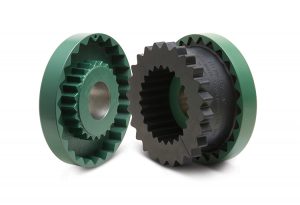 Over 50% of common applications can use a one-size-smaller coupling when using Sure-Flex Plus sleeves, reducing initial purchase cost as well as sleeve replacement cost. Sure-Flex Plus sleeves are also 100% interchangeable with existing flanges, supplying a true “drop-in” performance improvement.
Over 50% of common applications can use a one-size-smaller coupling when using Sure-Flex Plus sleeves, reducing initial purchase cost as well as sleeve replacement cost. Sure-Flex Plus sleeves are also 100% interchangeable with existing flanges, supplying a true “drop-in” performance improvement.
Testing of the new sleeves alongside popular competitive Sure-Flex “imitators” revealed wide variations in fatigue and wear performance. Specific results for accelerated fatigue and wear testing of representative sleeves are detailed in this paper.
30% Increased Torque Capacity
A considerable increase in the torque capacity of all improved EPDM and Neoprene sleeves was demonstrated during development testing. New sleeve ratings reflect the improvement with a 30% increase over original Sure-Flex torque ratings.
Fatigue Test – 3X Life vs. Competitor Sleeves
Fatigue test methods consisted of start-stop cycles repeated until the sleeve no longer transmitted torque. Test conditions were significantly more severe than in typical operation, as sleeves were subjected to higher loads than encountered in practical applications.
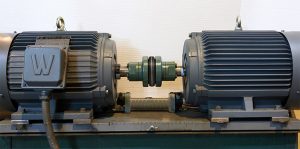 For start-stop fatigue life testing, EPDM 6E and Neoprene 6N type sleeves were chosen as representative elements (Fig. 1). Couplings were installed between two 15 HP motors (Fig. 2); one motor performed an across-the-line start with the rotor inertia of the opposing motor providing load. After five seconds at 1800 RPM, the first motor dynamically braked to a stop. Because the dynamic brake acted quickly enough to function as a second load cycle, total cycles were counted as two times the number of starts. This was repeated until sleeve fatigue, typically 1,000 to 50,000 cycles. At the end of the test, sleeves showed classic torsional fatigue.
For start-stop fatigue life testing, EPDM 6E and Neoprene 6N type sleeves were chosen as representative elements (Fig. 1). Couplings were installed between two 15 HP motors (Fig. 2); one motor performed an across-the-line start with the rotor inertia of the opposing motor providing load. After five seconds at 1800 RPM, the first motor dynamically braked to a stop. Because the dynamic brake acted quickly enough to function as a second load cycle, total cycles were counted as two times the number of starts. This was repeated until sleeve fatigue, typically 1,000 to 50,000 cycles. At the end of the test, sleeves showed classic torsional fatigue.
Fatigue Test – Results
Sleeve life varied widely, with TB Wood’s Sure-Flex Plus sleeves lasting 3X to 44X longer than common competitor sleeves.
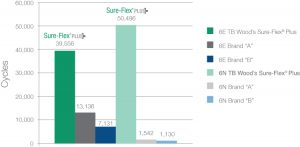 In testing of 6E EPDM type sleeves, Sure-Flex Plus 6E sleeves completed an average of over 39,000 cycles before reaching fatigue (Fig. 3). Competitor sleeves reached fatigue significantly sooner, with Brand “A” lasting an average 13,000 cycles and Brand “B” ending at 7,000 cycles.
In testing of 6E EPDM type sleeves, Sure-Flex Plus 6E sleeves completed an average of over 39,000 cycles before reaching fatigue (Fig. 3). Competitor sleeves reached fatigue significantly sooner, with Brand “A” lasting an average 13,000 cycles and Brand “B” ending at 7,000 cycles.
During testing of 6N Neoprene sleeves, the difference became even more pronounced. TB Wood’s Sure-Flex Plus 6N Neoprene sleeves lasted an average of 50,000 cycles, whereas Brand “A” lasted only approximately 1,500 cycles and Brand “B” lasted just 1,130 cycles.
Wear Test – Lower Deterioration vs Competitor Sleeves
Wear testing demonstrated Sure-Flex Plus sleeves to be the most rugged under adverse alignment conditions, as shown by visual inspection and sleeve weight change.
Wear test method consisted of running couplings at high misalignment exceeding catalog ratings, while cycling through three different loads during the 450 hour test. 6JE EPDM type sleeves were chosen for this representative test (Fig. 4).
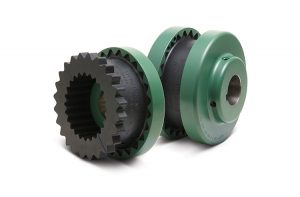 This test was run at very low torque and high misalignment, an extreme condition designed to accelerate tooth wear. Test torque levels were well below 6JE-type EPDM sleeve ratings of 585 in-lbs (Sure-Flex Plus) and 450 in-lbs (competitors). These low torque levels caused wear to become more pronounced due to relative movement between the sleeve and the flanges induced by lack of torsional wind-up in the sleeve.
This test was run at very low torque and high misalignment, an extreme condition designed to accelerate tooth wear. Test torque levels were well below 6JE-type EPDM sleeve ratings of 585 in-lbs (Sure-Flex Plus) and 450 in-lbs (competitors). These low torque levels caused wear to become more pronounced due to relative movement between the sleeve and the flanges induced by lack of torsional wind-up in the sleeve.
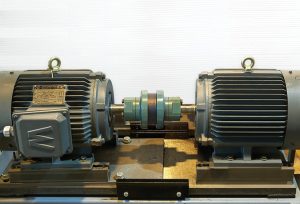 Couplings were placed between two 5 HP motors misaligned by 2°, four times the maximum angular misalignment for a variable speed application (Fig. 5). The motor speeds were 360, 900 and 1200 RPM, with load generated by offsetting the frequency between the motors.
Couplings were placed between two 5 HP motors misaligned by 2°, four times the maximum angular misalignment for a variable speed application (Fig. 5). The motor speeds were 360, 900 and 1200 RPM, with load generated by offsetting the frequency between the motors.
Wear Test – Results
Sleeve weights were measured before and after the 450 hour test. The weight loss was divided by the test length to give wear over time in mg/hr. Wear was also very apparent visually, since tooth profiles changed from rounded to pointed as the tooth surfaces wore away.
TB Wood’s Sure-Flex Plus sleeves demonstrated lower weight loss and less visual wear than competitive products.
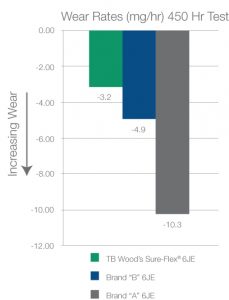
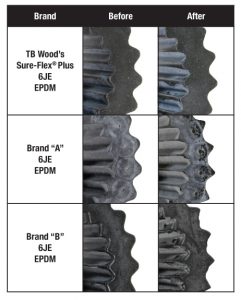
Competitor brands showed 4.9 mg/hr and 10.3 mg/hr wear rates, while Sure-Flex Plus sleeves showed 3.2 mg/hr material loss (Fig. 6).
Tooth shape in competitor sleeves became markedly worn and pointed, while the Sure-Flex Plus tooth shape remained round, displaying minimal wear (Fig. 7).
Conclusions
Improvements in TB Wood’s EPDM and Neoprene materials have brought a 30% increase in torque ratings to the industry-favorite Sure-Flex couplings.
New Sure-Flex Plus sleeves offer significant advantages to coupling users, allowing 50% of common applications to be designed with a one-size-smaller coupling, while giving increased durability to currently installed couplings using the new sleeve in existing flanges.
Tests show that the new Sure-Flex Plus sleeves soundly outperform competitors in both fatigue and wear trials.
Fatigue testing demonstrated that Sure-Flex Plus sleeves outlast common competitors by 3X to 44X, while wear testing showed Sure-Flex Plus sleeves retained significantly more material compared to common competitors during accelerated high-misalignment and low-load testing.
- OEM equipment designed to use a new TB Wood’s Sure-Flex Plus coupling should not be serviced with a competitor sleeve that does not match the Sure-Flex Plus rating.
- Competitive sleeves do not provide adequate service life at higher torque ratings where a Sure-Flex Plus coupling was originally installed.
- Competitive brand sleeves are NOT interchangeable with TB Wood’s EPDM and Neoprene Sure-Flex sleeves. However, competitor sleeves can be replaced by Sure-Flex Plus sleeves for improved coupling life, lowering maintenance costs.


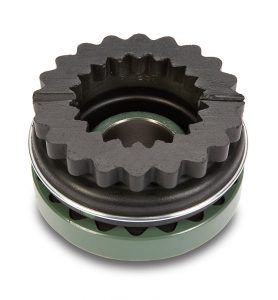
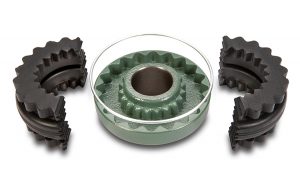
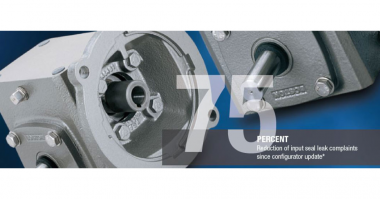
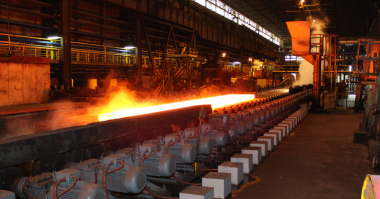

Comments